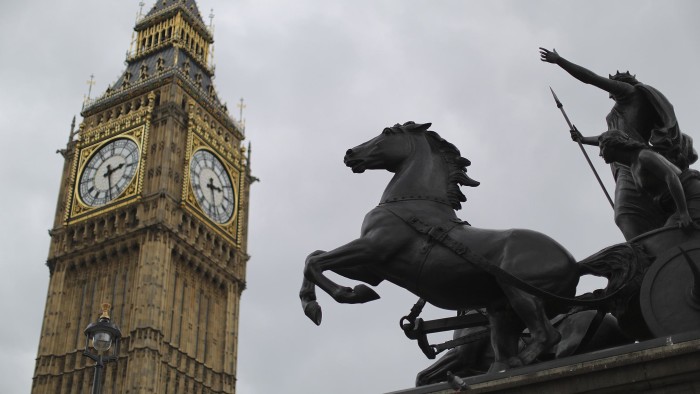Scottish independence: Conservative MPs take issue with proposed Holyrood powers

Roula Khalaf, Editor of the FT, selects her favourite stories in this weekly newsletter.
Recriminations were beginning to fly in Westminster on Tuesday as MPs took issue with a pledge by the three main political parties to hand more powers to Holyrood in what was being seen as a last-ditch and panicky attempt to convince Scotland to stay in the UK.
Mark Field, Conservative MP for the Cities of London and Westminster, said he was opposed to the recent flurry of commitments to greater devolution, which include giving increased tax and spending powers to the Scottish parliament.
“I just think that it is wrong – rushing through promises to give the Scots anything they want to vote No,” he told the Financial Times. “No one is thinking through the consequences of what it means for London, for the regions, for parliament. This is not a sensible way for thinking about these issues.”
“It is clear Scotland is going to be given a lot more now than was envisaged a couple of weeks ago when they [the No camp] were 20 per cent ahead in the polls, and that is no way to change the constitution.”
The three party leaders have agreed to an accelerated timetable for devolution but divisions remain about exactly what those powers should be, adding to the feeling within Westminster that the campaign has descended into chaos.
“If I was up there as a floating voter, I would be thinking this is a bit last-minute. I just find it incredible they are announcing this when some people have already voted,” said David Nuttall, Conservative MP for Bury North.
“If there was a blockbuster plan for devolution powers, the way I would have fought it is bringing it out a year ago.”
Mr Nuttall said he did not oppose further devolution in principle but added that as part of any wider settlement with Scotland, he and his fellow Conservative backbenchers would demand a resolution of the “West Lothian question” – the debate over whether Scottish MPs should have the same right to vote at Westminster as any English MP now that so many policy areas are devolved to the Scottish parliament.
“You can’t have your cake and eat it,” Mr Nuttall said. “You cannot have devolution and then say Scottish MPs will still be voting on matters that do not affect Scotland. We will need to draw up new rules on this as part of the settlement. There is a group of us that will push for that.”
In depth

Scotland will decide in a referendum to be held on September 18 whether or not to end the 307-year-old union with England
Further reading
There are also private mutterings from some Conservatives that the overtures and promises being made to the Scots will open up another line of attack from the UK Independence party going into the 2015 national election.
“If I were Nigel Farage [Ukip leader], I would be calling for an English parliament in response to this,” said one Conservative MP, who added the backlash from his own constituents on the issue had begun. With just one MP in Scotland, the Tories are an overwhelmingly English party.
But with the referendum just nine days away, many Conservative MPs are unwilling to air their misgivings in public, with a number urging their colleagues to keep their eyes on the bigger issue at stake: the preservation of the union.
“I want a No vote and I am not going to criticise the No campaign,” said one pro-union backbencher. “There will be a lot to say afterwards but in the next nine days everyone in favour of maintaining the union should say, we want the bigger prize.”
One Labour frontbencher who did not wish to be named said the rush for greater devolution was far from ideal but added the parties in Westminster had limited options given the Yes campaign’s surge in the polls over the weekend.
“We just have to be focused on winning now,” he said. “It is not ideal but you have got to pay the price to win this. It’s just politics.”
Another senior Labour figure said: “There is going to be more devolution – you cannot promise it and not deliver – [but] this is bound to raise questions around the constitution of the rest of the UK.”
Local authorities in England were also voicing concern and irritation at the new pledges of devolution, especially among those cities lobbying for more English regional powers.
David Sparks, chairman of the Local Government Association, which represents all but two of the 375 local authorities in England and Wales, said on Tuesday: “These freedoms should not just be an exclusive privilege for one country in the union. New powers being offered to Scotland in the event of a No vote must be given to every local area in England and Wales.
He added: “The appetite for devolution does not stop at the border and the rest of the UK will not be content to settle for the status quo. Local areas across the country need to be set free from the grip of Whitehall and allowed to raise and spend money in a way which will best serve the people who live there.”
The enhanced payments Scotland receives under the Barnett formula, permitting extra spending on areas such as social care, have long annoyed many on the English side of the border. The prospect of new concessions is especially worrying for those areas that have to compete directly with Scotland for investment.
Comments